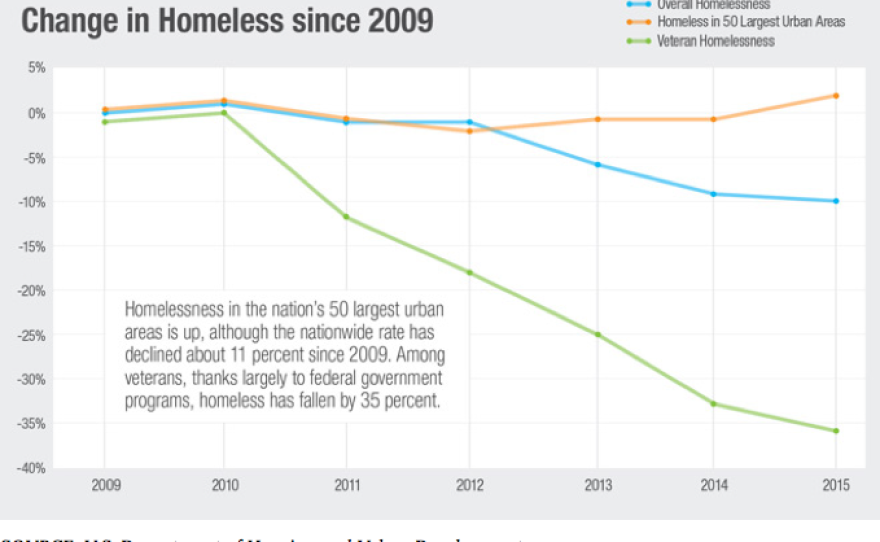Joining me with more on "Housing First" efforts are council member Todd Gloria the chair of the San Diego regional continuum of care Council which coordinates federal funding for the homeless across the County. Amy Gonyeau oh is chief operating officer for the Alpha Project. It's based on the "Housing First" model. Todd how successful has been the "Housing First" philosophy been? It's been incredibly successful. This is a national best practice, that's why we've adopted it. Not because had is requiring it but because it's proven. I would say, listening to Allison, we applied to any individual. It's incorrect to suggest that we are placing people behind door. "Housing First" is housing plus wraparound services. Ask your listeners to think about how hard it would be to kick and addiction or get their mental illness under control if there left to sorted out from themselves. We want to bring the people in off the streets, get them housing and services. The good news is that is incredibly less expect the -- expensive than leaving them on the streets so they can get into the system. We seem to need about 1000 permanent units to meet the demand and the shelters themselves are cutting back on the kinds of shelter they can provide. Where do we find ourselves? The truth of this story is that we have a large number of transitional housing beds that we are trying to transition into permanent. There are beds that go unused. The story is that in the shift from our past ways the state of California eliminated redevelopment which was our primary source of funding. This is not a failing of the "Housing First" approach, it is a feeling when it comes to having the financing mechanisms to build things like Alpha square which of gotten hundreds of the streets. The criticism should not be for "Housing First" approach, it should be a lack of public investment that is happening now. Amy, while we wait for the permanent units that we need, Alpha Project is working to set up a 600 bed intake center for nonpermanent shelter. What services would be provided? We are the visit -- biggest "Housing First" provider. I am the chair of the committee. We are serving the most vulnerable. The resource Todd is talking about is rapid rehousing. There are vouchers, that are not being used. People are living on the street. I would challenge anyone to try and find Todd and keep communicating with him. Central intake would provide us that, that's a barrier. Some people might say that's draining resources from the "Housing First" goal. We feel that that's needed. That is the place to start your process and start working on something while we are trying to find you an apartment. There is a lot of landlord initiative going on in this change will take time. Before that inventory, as the number of homeless people living on the streets continues to increase what do you see the city's obligation as? We believe in essential intake. We live those challenges and barriers every day. It took us six weeks to get one of our clients launched because he lost his cell phone. We found him finally. Let me ask you talk, Amy and the Alpha project are working on this temporary intake facility. There raising money. If this came before you on the sit on Council would you vote to allocate money for something like that? The temporary center? I'm leave -- a believer in the all hands on deck approach. I have the highest respect for Alpha Project. Volunteer for Alpha Project. I have a different point of view. I think there should be no wrong entry point into the system. When you find an individual and trying to follow up is difficult. We should make it easy for a homeless person to get off the streets and into the system of homelessness provision. Affect -- whether it's a veteran are disabled person or a family, they shouldn't have to come to just one place. Transportation is difficult. I'm a bit concerned about the idea of concentrating everything in a particular location. I'm not ignorant of the fact that it is hard to do. I have no trouble placing sites like this in my district. I have stood up to folks who don't want these. I think every time I've been proven correct. People complain on the front end, once it's open, I get no complaints. That isn't necessarily evidence for other people. If it's not in Council district 3 and we have a regionwide problem it's not just downtown. I would have to wonder where that central facility would be, whether it would have support to get it done and whether or not there should be one door of entry or all doors should be the door of entry. Just to speak on that, we aren't saying this is the only place where saying here is a place. If somebody wanted to go to another program. We just care about people not being homeless. Here is a low barrier program that we think would encourage people to come get the help they need and there is an issue placing people in the beds. We aren't saying you can't go somewhere else. We love them, we don't want to see them die. I've been speaking with Amy Gonyeau and Todd Gloria.
Amber Gonzales, Michael Mendez and their baby, Cindy, have just moved into Operation Hope. The Vista shelter serves homeless families and women. For more than a decade it’s been a winter shelter. But as of this month, it’s open year-round.
“We’ve been together for about a year,” Gonzales said. “And we were using (drugs) when I got pregnant, so I wanted to get clean so I could keep her and give her the life that I wasn’t able to give to my other kids.”
Sitting on the bottom bunk of their small bedroom at Operation Hope, Gonzales said she’s had drug problems for 10 years, but now she’s been clean for 11 months. She and Mendez are determined to use the time in this drug-free shelter to work, build up savings and stay clear of methamphetamine. For them, it’s vital that no one else in this safe haven is using drugs.
“Yeah,” she said, as Mendez nodded on the bunk beside her. “That would make a big difference because it would trigger us. It would make us want to go back out and use.”
Operation Hope operates using private funds so that it can require those it serves to be drug free. A stipulation of federal funding is that programs operate under the Housing First policy, which requires providers to offer shelter immediately, without setting conditions such as being drug free.
This requirement is causing another shelter for families in Vista to close.
The nonprofit Solutions for Change has run the shelter for more than a decade — it’s the first stop for families who then move into a long term program: the 1,000-day Solutions University.
Solutions Chief Executive Officer Chris Megison said he has no choice but to close the intake shelter because it has lost $90,000 a year in federal funding.
“Not having that is catastrophic for us,” he said. “We can’t keep it open. And this is the first year in all those years that we will not have got the money.”

When 16-year-old McKenzie Pankey entered the Solutions for Change intake shelter with her mother, Jennifer, seven years ago, her life changed.
“When you see families that do drugs with their kids in the household, usually you see those kids growing up and becoming addicts themselves,” she said. “When you come to the shelter and you have a stable environment where there’s nobody using, it gives you — it gave me — a good place to grow up in.”
Jennifer Pankey said she would not have been able to change her and her daughter’s life if the Solutions for Change program had not required everyone in it to be drug free.
“If I had lived with people who were actively using, I would not have been able to stay clean, I just wouldn’t have,” she said. “It’s so hard. It’s like if someone had lung cancer and they quit smoking and they go through remission and then we say, ‘OK, we know you’re going through a tough remission and you are a warrior and a survivor, but now you’re going to have to live in housing with everyone who smokes.’”
Megison said the clients who go through his program want a drug-free environment. He does not object to the Housing First philosophy, but he believes there should be options. When working with families, he said, the condition that his program offer shelter without requiring clients be clean is counterproductive.
“We’re not looking at just getting people behind a door,” he said. “What we really are trying to do is get people out of the churn and the dependency systems, get them off all of the government aid.”

Megison said over the years Solutions University has saved millions of dollars in public subsidies such as welfare and food stamps because the participants learn to become self supporting. He has raised millions of dollars in private funding to build the program, with 133 units and an agricultural work program.
The long-term programs will continue, he said, in spite of losing more than $600,000 in federal funding because of the Housing First stipulations.
But the emergency intake shelter — the triage point for new families coming into the program — gets 75 percent of its support from federal funds. Megison said he has raised about $10,000 to help replace the $90,000 lost, but it’s not enough. He said he will not send the dozen or so families living at the shelter back to the streets, but they may have to double up with some of the families who are further ahead in the program and already living in apartments.
Operation Hope is able to stay open year-round because the organization has turned to mostly local and mostly private funding, said Operation Hope’s director Kathleen Higgins.
“I’ve been doing this for 20 years — 20 years ago, almost all of us got 80 percent of our funding from government,” she said.
But now, Higgins said, shelters like Operation Hope know they have to operate without federal funding from the Department of Housing and Urban Development, or HUD, because of the Housing First conditions.
“We understand why HUD enacted the law,” Higgins said. “Their focus for the next few years is eliminating veterans’ homelessness.”
Greg Anglea, director of Interfaith Community Services in Escondido, leads the Alliance for Regional Solutions, a group of homeless agencies and services in North County. He said Housing First is working successfully to end veteran homelessness nationwide.
“Over the last three to five years, homelessness among veterans has decreased nearly 50 percent,” he said. “That’s the result of increasing resources being focused on veterans’ services, but also the implementation of Housing First methodologies.”

The Housing First approach is resulting in a major shift in how homelessness is addressed.
“You have an entire system of care that is transforming,” Anglea said.
An effort to build up transitional housing is now gradually evolving into a program of long-term housing. Although more vouchers are available to help homeless get into more permanent housing, a shortage of available rentals is creating a bottleneck.
Short-term winter shelters are evolving into year-round shelters to prepare homeless individuals and families to become self sustaining and step into long-term housing. Three of the five winter shelters in North County are now open year-round.
Anglea said local funding from the nine North County cities makes up only about $200,000 of the $1.5 million operating budget of the homeless programs run by the Alliance for Regional Solutions. So the need for other funding is significant.
While the regional program is changing to meet the requirements of the federal Housing First policy, family shelters like Operation Hope say they’ll rely on local and private money to run their services.
Michael Mendez said for him, Gonzalez and their baby, the first step is to stay clean and build up a work record before they start looking for a home.
There are not enough individual homes available to offer to each homeless family, and a drug-free environment is vital when staying in the close quarters of a shelter.
“The drive to want to work has enabled me to get off parole and try to be there for my family,” Mendez said. “But you know, I’m fighting and struggling every day to stay clean and sober.”
Both Mendez and Gonzales now have jobs, but it will be a few weeks until they can head out on their own.
“I want to be successful in this place, where me and Amber, both of us are working together and doing everything we possibly can to get into our own apartment, and be able to support each other,” he said.
The goal at Operation Hope is to move families through in 90 days. The key to a family’s success will be to live in a drug-free environment. These homeless providers say if that means sacrificing federal funding, it’s worth it.







